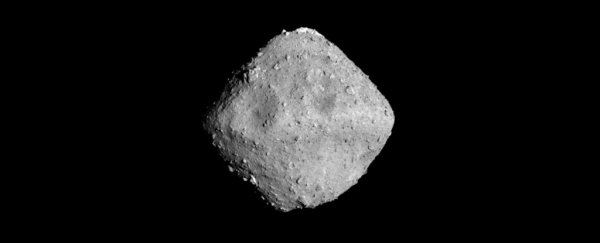In 2014, the Japanese Space Agency JAXA launched the Hayabusa 2 spacecraft to visit asteroid Ryugu. It arrived at the asteroid in June 2018 and studied it from orbit for over a year. Hayabusa 2 even dispatched four rovers to the asteroid's surface.
After departing, it flew past Earth in December 2020, dropping off a sample of Ryugu.
Of all the scientific results from that impressive mission, the most interesting one might be this: Asteroid Ryugu might not be an asteroid. It might be the remnant of a comet.
The Hayabusa 2 mission showed that asteroid Ryugu is a rubble pile asteroid. Instead of being one large, monolithic chunk of rock, it's a conglomeration of smaller rocks.
Like some other asteroids, it's shaped like a spinning top. The asteroid's rapid rotation forged it into this shape.
The authors say that "a widely accepted formation scenario for Ryugu is a catastrophic collision between larger asteroids and the subsequent slow gravitational accumulation of collisional debris."
A lot of Hyabusa 2's evidence supported the idea that Ryugu is an asteroid, which astronomers assumed was the case since its discovery in 1999.
But one thing stood out among the evidence that didn't fit with the asteroid definition: Ryugu has a high concentration of organic matter.
If Ryugu is a rubble pile asteroid created from the collision of two smaller asteroids, then why does it have so much concentrated organic matter?
That question is at the heart of a new study published in The Astronomical Journal Letters titled "The Asteroid 162173 Ryugu: a Cometary Origin." The lead author is Associate Professor Hitoshi Miura of Nagoya City University.
In their paper, the authors say that not only might Ryugu be the remnant of a comet, but similar rubble-pile asteroids might also be former comets. Astronomers call these objects Comet Asteroid Transition (CAT) objects.
Comets form in the distant cold reaches of the Solar System. Unlike asteroids, which are all rock, comets are icy and contain rock and frozen volatiles. The volatiles are mostly water ice, but comets also contain frozen carbon dioxide, ammonia, methane, and carbon monoxide. Astronomers sometimes call them "dirty snowballs."
Comets also have an unbound atmosphere. When they approach the Sun, the warmth melts some volatiles creating the atmosphere, and they sublimate into space. The atmosphere contains dust as well as volatile gases.
But after passing close to the Sun many times, some comets have lost all their volatiles to space. What's left is just rock. Those are sometimes called extinct comets.
If Ryugu is indeed a former comet, can that account for Ryugu's characteristics?
Ryugu rotates rapidly, which could stem from its previous life as a comet. "Ice sublimation causes the comet's nucleus to lose mass and shrink, which increases its speed of rotation," said lead author Miura in a press release. "As a result of this spin-up, the cometary nucleus may acquire the rotational speed required to form a spinning-top shape."
According to Miura, the extinct comet hypothesis can also explain the high organic matter content. The organic molecules detected include CO, CO2, methanol, carbonyl sulfide, formaldehyde, formic acid, methane, and cyanate.
"Additionally, the icy components of comets are thought to contain organic matter generated in the interstellar medium. These organic materials would be deposited on the rocky debris left behind as the ice sublimates."
Comets like Ryugu have the same organics as carbonaceous chondrite asteroids, but they're concentrated on the surface. "The local concentration may account for the extremely high organic content inferred from albedo," the paper states.
The research team tested their hypothesis with numerical simulations. They calculated how long it would take for Ryugu to lose all its volatiles and become a rocky remnant. They also calculated the increase in rotational speed required to shape the asteroid into what it is today.
"Our calculation suggests that Ryugu was once a comet and active for the first several 10 kyr and spent the rest of its dynamic lifetime as a rubble-pile asteroid," the study says. "This scenario is consistent with the dynamical evolution of modern comets in the solar system."
This study focuses on asteroids with three characteristics: spinning top-shaped, rubble-pile composition/morphology, and high concentration of organics. The results show that Ryugu and similar asteroids are comet-asteroid transition objects (CATs).
"CATs are small objects that were once active comets but have become extinct and apparently indistinguishable from asteroids," explains Miura. "Due to their similarities with both comets and asteroids, CATs could provide new insights into our solar system."
Hayabusa 2 returned its Ryugu samples to Earth, and another mission will soon do the same. NASA's OSIRIS-REx spacecraft visited asteroid Bennu, an asteroid very similar to Ryugu, and will return its samples to Earth in 2023. Analysis of these samples should confirm whether Ryugu and Bennu are asteroids or CATs.
This article was originally published by Universe Today. Read the original article.
